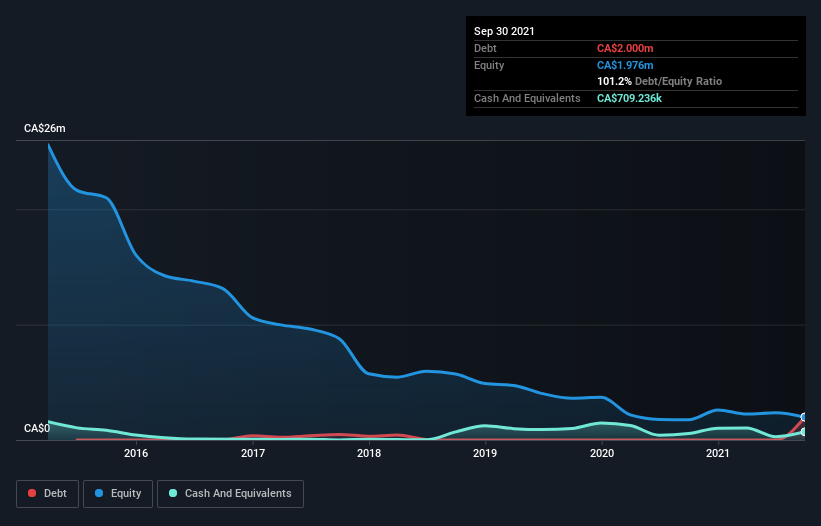The external fund manager backed by Berkshire Hathaway's Charlie Munger, Li Lu, makes no bones about it when he says 'The biggest investment risk is not the volatility of prices, but whether you will suffer a permanent loss of capital.' It's only natural to consider a company's balance sheet when you examine how risky it is, since debt is often involved when a business collapses. Importantly, New Zealand Energy Corp. (CVE:NZ) does carry debt. But is this debt a concern to shareholders?
What Risk Does Debt Bring?
Generally speaking, debt only becomes a real problem when a company can't easily pay it off, either by raising capital or with its own cash flow. If things get really bad, the lenders can take control of the business. However, a more usual (but still expensive) situation is where a company must dilute shareholders at a cheap share price simply to get debt under control. Of course, plenty of companies use debt to fund growth, without any negative consequences. When we examine debt levels, we first consider both cash and debt levels, together.
See our latest analysis for New Zealand Energy
What Is New Zealand Energy's Debt?
The image below, which you can click on for greater detail, shows that at September 2021 New Zealand Energy had debt of CA$2.00m, up from none in one year. However, it does have CA$709.2k in cash offsetting this, leading to net debt of about CA$1.29m.

A Look At New Zealand Energy's Liabilities
We can see from the most recent balance sheet that New Zealand Energy had liabilities of CA$3.62m falling due within a year, and liabilities of CA$8.70m due beyond that. On the other hand, it had cash of CA$709.2k and CA$1.03m worth of receivables due within a year. So its liabilities total CA$10.6m more than the combination of its cash and short-term receivables.
This deficit casts a shadow over the CA$4.18m company, like a colossus towering over mere mortals. So we'd watch its balance sheet closely, without a doubt. At the end of the day, New Zealand Energy would probably need a major re-capitalization if its creditors were to demand repayment. There's no doubt that we learn most about debt from the balance sheet. But it is New Zealand Energy's earnings that will influence how the balance sheet holds up in the future. So if you're keen to discover more about its earnings, it might be worth checking out this graph of its long term earnings trend.
Over 12 months, New Zealand Energy made a loss at the EBIT level, and saw its revenue drop to CA$4.9m, which is a fall of 27%. To be frank that doesn't bode well.
Caveat Emptor
Not only did New Zealand Energy's revenue slip over the last twelve months, but it also produced negative earnings before interest and tax (EBIT). Its EBIT loss was a whopping CA$774k. Combining this information with the significant liabilities we already touched on makes us very hesitant about this stock, to say the least. That said, it is possible that the company will turn its fortunes around. But we think that is unlikely, given it is low on liquid assets, and burned through CA$2.1m in the last year. So we think this stock is risky, like walking through a dirty dog park with a mask on. The balance sheet is clearly the area to focus on when you are analysing debt. However, not all investment risk resides within the balance sheet - far from it. To that end, you should learn about the 4 warning signs we've spotted with New Zealand Energy (including 1 which is concerning) .
When all is said and done, sometimes its easier to focus on companies that don't even need debt. Readers can access a list of growth stocks with zero net debt 100% free, right now.
Valuation is complex, but we're here to simplify it.
Discover if New Zealand Energy might be undervalued or overvalued with our detailed analysis, featuring fair value estimates, potential risks, dividends, insider trades, and its financial condition.
Access Free AnalysisHave feedback on this article? Concerned about the content? Get in touch with us directly. Alternatively, email editorial-team (at) simplywallst.com.
This article by Simply Wall St is general in nature. We provide commentary based on historical data and analyst forecasts only using an unbiased methodology and our articles are not intended to be financial advice. It does not constitute a recommendation to buy or sell any stock, and does not take account of your objectives, or your financial situation. We aim to bring you long-term focused analysis driven by fundamental data. Note that our analysis may not factor in the latest price-sensitive company announcements or qualitative material. Simply Wall St has no position in any stocks mentioned.
About TSXV:NZ
New Zealand Energy
Through its subsidiaries, engages in the exploration, production, development, and appraisal of oil and natural gas in New Zealand.
Moderate risk with worrying balance sheet.
Market Insights
Community Narratives



